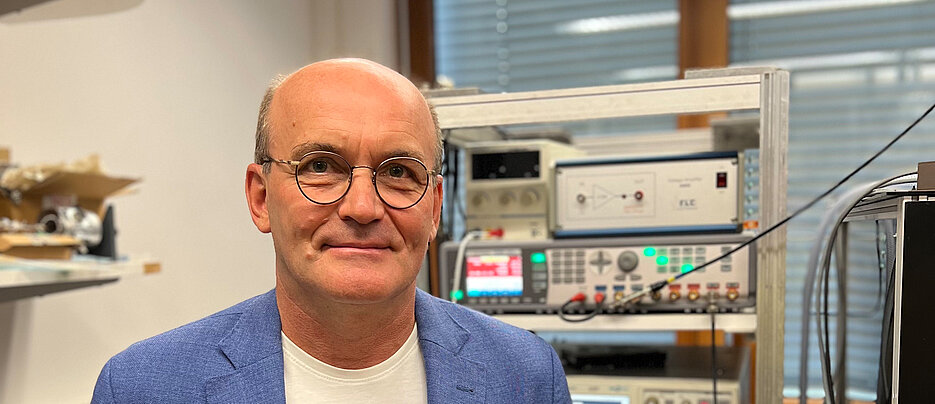ERC Advanced Grant for Vladimir Dyakonov
10/07/2022With 2.5 million euros from the European Research Council, Professor Vladimir Dyakonov will be able to pursue the development of a novel quantum sensor: The physicist was awarded an ERC Advanced Grant.
Developing completely new types of sensors that can probe temperature, pressure, electric and magnetic fields far more precisely than has been possible up to now: this is the task that Vladimir Dyakonov's team at Julius-Maximilians-Universität Würzburg (JMU) is working on. The professor is the chair of Experimental Physics VI.
The European Research Council (ERC) has awarded the Würzburg physicist a prestigious award, an Advanced Grant worth 2.5 million euros, for research into the quantum properties of so-called two-dimensional materials and for the development of quantum sensors. With this type of award, the ERC provides long-term funding for a groundbreaking, high-risk project to established individuals in any field of research, with excellence as the sole criterion.
A hot candidate: hexagonal boron nitride
The ERC-funded research project is entitled "Quantum sensing with van der Waals heterostructures based on hexagonal boron nitride" (BoNi-SENS). It is based on the discovery of atomic defects in boron nitride by Dyakonov's team about two years ago. The defects have a magnetic moment (spin) and therefore are very sensitively to their environment.
Hexagonal boron nitride consists of boron and nitrogen atoms that form a honeycomb-shaped, flat crystal lattice. This structure is highly compatible with other crystalline materials, such as graphene. Due to its flat geometry, it also offers the best integration possibilities in electronics, for example in the form of stacked layer structures.
If the defects can be embedded at the desired sites in the atomic layer of such heterostructures, the electronic components can be controlled with very high precision.
About the ERC prizewinner
Vladimir Dyakonov (58) has held the Chair of Experimental Physics VI at JMU since 2004. He was born in the Soviet Union and graduated in physics from Leningrad University. In 1996, he received his doctorate from the A. F. Ioffe Physico-Technical Institute.
Research stations followed at the universities of Bayreuth, Antwerp, Linz and Oldenburg, where he habilitated in 2001. In 2004, he accepted a call to JMU. Here, he also headed for 15 years the Bavarian Centre for Applied Energy Research (ZAE Bayern e.V.), where he now works as a scientific advisor. The professor still feels a strong commitment to energy research. Since 2019, Dyakonov is also Principal Investigator of the Würzburg-Dresden Cluster of Excellence ct.qmat - Complexity and Topology in Quantum Matter.
Funding also for the IQ-Sense project
Recently, Vladimir Dyakonov has been able to attract substantial funding for the development of the novel quantum sensors: The Bavarian State Ministry of Science and the Arts has funded the IQ-Sense project with three million euros.
As part of the Bavarian initiative "Lighthouse Projects for Research, Development and Applications in Quantum Sciences and Quantum Technologies", the project brings together research groups from JMU and TU Munich. Dyakonov coordinates the project. The focus of IQ-Sense is on the application of quantum sensor technology in medical and bioimaging.
Contact
Prof. Dr. Vladimir Dyakonov, Chair of Experimental Physics VI, University of Würzburg, T +49 931 31-83111, vladimir.dyakonov@uni-wuerzburg.de







